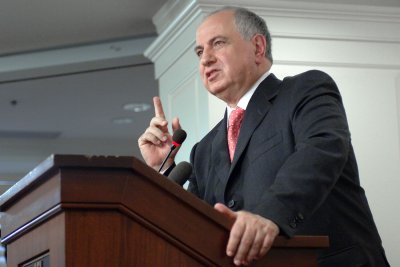Topic: Ahmed Chalabi
Quotes
Discussions with Ayatollah Sistani focused on matters that concern the Iraqi people especially the new constitution which should be the basis for national reconciliation and unity
Sistani urges all Iraqis to help in draft Jul 27, 2005
By accepting a royal pardon, I will be implying that I am guilty. That is why I ask to be tried according to the Jordanian law but by a civil court
Chalabi seeks trial in Jordan civil court May 17, 2005
We will arrest him and hand him over to Interpol
Iraqi leaders trade charges in arms scam Jan 22, 2005
Saddam used to send his instructions to the resistance leaders through messengers telling them hit all collaborators with the Americans, attack government centers and sabotage bridges
Saddam led anti-U.S. resistance Jul 23, 2004
The documents possessed by Saddam carried the names of the leaders of the resistance networks, including 26 senior military commanders in his Baath party
Saddam led anti-U.S. resistance Jul 23, 2004
Ahmed Abdel Hadi Chalabi (Arabic: أحمد الجلبي) (born October 30, 1944) is an Iraqi politician. He was interim oil minister in Iraq in April-May 2005 and December-January 2006 and deputy prime minister from May 2005 until May 2006. Chalabi failed to win a seat in parliament in the December 2005 elections, and when the new Iraqi cabinet was announced in May 2006, he was not awarded a post. Once dubbed the "George Washington of Iraq" he has fallen out of favor and is currently under investigation by several U.S. government sources. He was also the subject of a 2008 biography by investigative journalist Aram Roston, The Man Who Pushed America to War; The Extraordinary Life, Adventures, And Obsessions of Ahmad Chalabi.
Chalabi was also part of a three-man executive council for the umbrella Iraqi opposition group, the Iraqi National Congress (INC), created in 1992 for the purpose of fomenting the overthrow of Iraqi president Saddam Hussein. Although the INC received major funding and assistance from the United States, it never had any influence or any following to speak of in Iraq after the 2003 invasion. The INC's influence gradually waned until the December 2005 elections, in which it failed to win a single seat in Parliament.
Chalabi is a controversial figure for many reasons. In the lead-up to the 2003 invasion of Iraq, under his guidance the INC, with the assistance of lobbying powerhouse BKSH & Associates, provided a major portion of the information on which U.S. Intelligence based its condemnation of Saddam Hussein, including reports of weapons of mass destruction and alleged ties to al-Qaeda. Most, if not all, of this information has turned out to be fictitious. That, combined with the fact that Chalabi subsequently boasted, in an interview with the British Sunday Telegraph, about the impact that their alleged falsifications had on American policy, led to a falling out between him and the United States. Furthermore, Chalabi has been found guilty of the Petra banking scandal in Jordan (see below).
It uses material from the Wikipedia article "Ahmed Chalabi."



